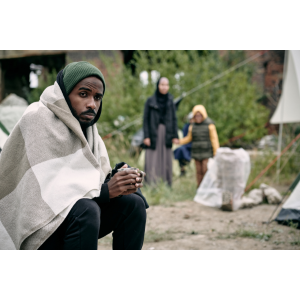Dignitas Infinita:
Drama of Poverty & Travail of Migrants
Dignitas Infinita ("Infinite Dignity") highlights several relevant grave violations of human dignity. This reflection focuses on the drama of poverty and the travail of migrants.
Dignitas Infinita quotes Pope St. John Paul II on poverty, “One of the greatest injustices in the contemporary world consists precisely in this: that the ones who possess much are relatively few and those who possess almost nothing are many. It is the injustice of the poor distribution of the goods and services originally intended for all.” Despite the increase of wealth throughout the world, “the dignity of the poor is doubly denied because of the lack of resources available to meet their basic needs and the indifference shown toward them by their neighbors” (paragraph 36). The Declaration also stresses the need for workers’ rights, “’there is no poverty worse than that which takes away work and the dignity of work.’”
Newcomers are too often deprived of these basic needs, as detailed in paragraph 40, “Migrants are among the first victims of multiple forms of poverty. Not only is their dignity denied in their home countries, but also their lives are put at risk because they no longer have the means to start a family, to work, or to feed themselves.” The paragraph continues, “It is urgent to remember that ‘every migrant is a human person who, as such, possesses fundamental, inalienable rights that must be respected by everyone and in every circumstance.’ Receiving migrants is an important and meaningful way of defending ‘the inalienable dignity of each human person regardless of origin, race or religion.’”
Following the directives of Jesus Christ, the Catholic Church worldwide frequently serves as the first provider of basic needs to individuals and families seeking refuge. Catholic ministries in the United States see a migrant first as a son or daughter of God and provide needed humanitarian aid while following immigration laws and respecting the need for our country to regulate its borders. Unfortunately, rhetoric from some political figures and media outlets has claimed basic humanitarian outreach, like that of Catholic ministries on the border, somehow facilitates criminal activity. However, these Catholic ministries cooperate in providing humanitarian aid with local, state, and federal officials while following the Gospel faithfully. See more on this in a short explainer from the USCCB.
Current Legislation:
Seeking to uphold the dignity of migrants and those experiencing poverty, the Catholic Conference of Ohio persistently advocates for support such as child tax credits, affordable housing, and food assistance programs. During this legislative session, CCO testified on the following bills:
- In support of HB 106 (Passed by House; In Senate Committee) which requires employers to provide pay stubs to employees, helping ensure they receive fair wages for the hours worked.
- In opposition to HB 451 (In House Committee) which would levy a remittance transfer fee on money transmissions to a person outside the U.S., placing onerous restrictions on those supporting loved ones stuck in cycles of poverty and violence.
Reflection:
Political rhetoric, especially during election years, often fails to recognize the humanity of specific populations. Do we first view our brothers and sisters of different countries of origin as sons and daughters of God to be loved or as needing to make themselves worthy of their presence? Do we seek to understand why families flee their places of birth, usually under great duress and distress, or immediately label them as outsiders? How do we answer the question of, “And who is my neighbor?” (Luke 10:29)